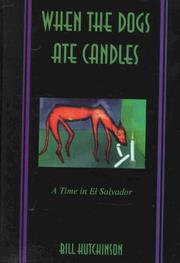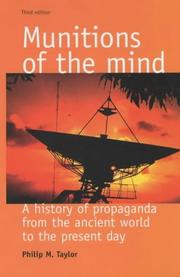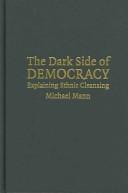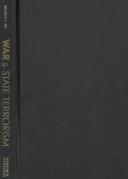| Listing 1 - 9 of 9 |
Sort by
|

ISBN: 1856497674 1856497666 Year: 1999 Publisher: London Zed Books
Abstract | Keywords | Export | Availability | Bookmark
 Loading...
Loading...Choose an application
- Reference Manager
- EndNote
- RefWorks (Direct export to RefWorks)
Internal politics --- Political sociology --- Latin America --- Violence --- Political violence --- Terror --- State-sponsored terrorism --- Violence politique --- Terreur --- Terrorisme d'Etat --- #SBIB:328H32 --- #SBIB:327.5H20 --- Instellingen en beleid: Midden en Latijns-Amerika --- Vredesonderzoek: algemeen --- Political violence - Latin America. --- Terror - Latin America. --- State-sponsored terrorism - Latin America. --- Government violence --- Governmental violence --- State-sponsored violence --- State terrorism --- Violence, Governmental --- Violence, State-sponsored --- Fear --- Terrorism --- Political atrocities --- Political crimes and offenses

ISBN: 0870814753 0585021910 9780585021911 9780870814754 Year: 1998 Publisher: Niwot, Colo University Press of Colorado
Abstract | Keywords | Export | Availability | Bookmark
 Loading...
Loading...Choose an application
- Reference Manager
- EndNote
- RefWorks (Direct export to RefWorks)
When the Dogs Ate Candles: A Time in El Salvador follows one U.S. citizen as the journeys into the terrible reality of El Salvador in the 1980s, a reality that made the term "death squad" common in the English-speaking world. Galvanized by what he learned in a chance encounter in 1986, the author, Bill Hutchinson, undertook a novel strategy to protect human rights workers in El Salvador. Called "the Accompaniment Project," the plan brought U.S. volunteers to El Salvador to remain by the side of Salvadorans involved in human rights work. This is also the story of Salvadorans who stood up to a barbaric regime: the savage torture of Mirtala Lopez, a teenaged leader of a refugee organization who survived to continue her work among the displaced; the human rights work of Herbert Anaya, leader of the Non-Governmental Human Rights Commission of El Salvador, who was assassinated in 1987; and the testimony of an embittered army defector, Cesar Vielman Joya Martinez, who escaped to the U.S. to tell that his unit operated as a clandestine death squad unit using funds provided by U.S. supervisors. U.S. citizens are also here: Brian Willson, the Vietnam veteran who lost his legs when he sat in front of a munitions train, and Rep. Barbara Boxer (D-CA) who carried photographic evidence of the war's savagery to the floor of the House.
El Salvador --- Politics and government --- 1979-1992 --- Human rights workers --- State-sponsored terrorism --- History --- 20th century --- Criminology, Penology & Juvenile Delinquency --- Social Welfare & Social Work --- Social Sciences --- Activists, Human rights --- Advocates, Human rights --- Defenders of human rights --- Human rights activists --- Human rights advocates --- Human rights defenders --- Workers, Human rights --- Reformers --- Government violence --- Governmental violence --- State-sponsored violence --- State terrorism --- Violence, Governmental --- Violence, State-sponsored --- Political atrocities --- Terrorism

ISBN: 0719067677 Year: 2003 Publisher: Manchester Manchester university press
Abstract | Keywords | Export | Availability | Bookmark
 Loading...
Loading...Choose an application
- Reference Manager
- EndNote
- RefWorks (Direct export to RefWorks)
Anti-American propaganda --- Dictatorship [Terrorist ] --- Dictature terroriste --- Dictatuur [Terroristische ] --- Geweld [Staats] --- Propaganda [Anti-American ] --- Propaganda [Anti-Amerikaanse ] --- Propagande anti-americaine --- Staatsgeweld --- Staatsterrorisme --- State violence --- State-sponsored terrorism --- Terrorism and mass media --- Terrorisme d'Etat --- Terrorisme en massamedia --- Terrorisme et mass media --- Terrorist dictatorship --- Terroristische dictatuur --- Violence [State ] --- Violence d'Etat --- #KVHA:Retoriek --- #KVHA:Argumentatie --- #KVHA:Propaganda --- Propaganda, Anti-American --- Propaganda --- Mass media and terrorism --- Mass media --- Government violence --- Governmental violence --- State-sponsored violence --- State terrorism --- Violence, Governmental --- Violence, State-sponsored --- Political atrocities --- Terrorism --- History --- Propaganda, Anti-American. --- State-sponsored terrorism. --- Terrorism and mass media. --- History. --- Propaganda History

ISBN: 052183130X 0521538548 9780521538541 9780521831307 9780511817274 0511230885 0511231652 0511316798 0511817274 1280702117 0511229267 0511230109 9780511231650 Year: 2005 Publisher: Cambridge Cambridge University Press
Abstract | Keywords | Export | Availability | Bookmark
 Loading...
Loading...Choose an application
- Reference Manager
- EndNote
- RefWorks (Direct export to RefWorks)
A new theory of ethnic cleansing based on the most terrible cases (colonial genocides, Armenia, the Nazi Holocaust, Cambodia, Yugoslavia, Rwanda) and cases of lesser violence (early modern Europe, contemporary India, and Indonesia). Murderous cleansing is modern, 'the dark side of democracy'. It results where the demos (democracy) is confused with the ethnos (the ethnic group). Danger arises where two rival ethno-national movements each claims 'its own' state over the same territory. Conflict escalates where either the weaker side fights because of aid from outside, or the stronger side believes it can deploy sudden, overwhelming force. Escalation is not simply the work of 'evil elites' or 'primitive peoples'. It results from complex interactions between leaders, militants, and 'core constituencies' of ethno-nationalism. Understanding this complex process helps us devise policies to avoid ethnic cleansing in the future.
Social ethics --- Political philosophy. Social philosophy --- World history --- Democracy --- Ethnicity --- Genocide. --- Political atrocities. --- State-sponsored terrorism. --- Moral and ethical aspects. --- Political aspects. --- Genocide --- Political atrocities --- State-sponsored terrorism --- Government violence --- Governmental violence --- State-sponsored violence --- State terrorism --- Violence, Governmental --- Violence, State-sponsored --- Terrorism --- Atrocities --- Cleansing, Ethnic --- Ethnic cleansing --- Ethnic purification --- Ethnocide --- Purification, Ethnic --- Crime --- Moral and ethical aspects --- Political aspects --- INDIA -- 930.3 --- INDONESIA -- 930.3 --- CAMBODJA -- 930.3 --- CHINA -- 930.3 --- USSR -- 930.3 --- RWANDA -- 930.3 --- Atrocités politiques --- Génocide --- Terrorisme d'Etat --- Ethnicité --- Démocratie --- Aspect politique --- Aspect moral --- Social Sciences --- Sociology

ISBN: 0742523918 074252390X 129984958X 1417503505 9781417503506 9780742523906 9780742523913 Year: 2004 Volume: *1 Publisher: Lanham, Md. Rowman & Littlefield Publishers
Abstract | Keywords | Export | Availability | Bookmark
 Loading...
Loading...Choose an application
- Reference Manager
- EndNote
- RefWorks (Direct export to RefWorks)
Tracing the course of conflicts throughout Asia in the past century, this groundbreaking volume is the first to explore systematically the nexus of war and state terrorism. Challenging states' definitions of terrorism, which routinely exclude their own behavior, the book focuses especially on the nature of Japanese and American wars and crimes of war. This rare comparative perspective examines the ways in which state terror leads to civilian casualties, war crimes, and crimes against humanity. In counterbalance, they discuss anti-war movements and international efforts to protect human rights.
State-sponsored terrorism --- History --- Asia --- Japan --- United States --- History, Military --- Asia -- History -- 20th century. --- Asia -- History, Military -- 20th century. --- Japan -- History, Military -- 20th century. --- State-sponsored terrorism -- Asia -- History -- 20th century. --- United States -- History, Military -- 20th century. --- Middle East --- Regions & Countries - Asia & the Middle East --- History & Archaeology --- Government violence --- Governmental violence --- State-sponsored violence --- State terrorism --- Violence, Governmental --- Violence, State-sponsored --- Asian and Pacific Council countries --- Nihon --- Nippon --- Iapōnia --- Zhāpān --- I︠A︡ponii︠a︡ --- Yapan --- Japon --- Japão --- Japam --- Mư̄ang Yīpun --- Prathēt Yīpun --- Yīpun --- Jih-pen --- Riben --- Government of Japan --- Political atrocities --- Terrorism --- Eastern Hemisphere --- Eurasia --- 日本 --- 日本国 --- Nipponkoku --- Nippon-koku --- Nihonkoku --- Nihon-koku --- State of Japan --- Япония --- Japani --- اليابان --- al-Yābān --- يابان --- Yābān --- Japonsko --- Giappone --- Japonia --- Japonya --- History [Military ] --- 20th century --- Jepun --- Yapon --- Yapon Ulus --- I︠A︡pon --- Япон --- I︠A︡pon Uls --- Япон Улс
Book
ISBN: 9071665291 9789071665295 Year: 1992 Publisher: Bruselas NCOS
Abstract | Keywords | Export | Availability | Bookmark
 Loading...
Loading...Choose an application
- Reference Manager
- EndNote
- RefWorks (Direct export to RefWorks)
State-sponsored terrorism --- Victims of state-sponsored terrorism --- History --- 813 Methodologie --- 821.5 Mensenrechten --- 841 Politiek Bestel --- 850 Vrede- en conflictstudies --- 854 Terrorisme --- 855.5 Gewapende groeperingen --- 882.2 Zuid-Amerika --- C8 --- Colombia [land in werelddeel Amerika] --- terrorisme --- Ideologie en politiek --- Colombia --- Armed Forces --- Political activity. --- Politics and government --- State-sponsored terrorism victims --- Victims of state terrorism --- Victims of terrorism --- Government violence --- Governmental violence --- State-sponsored violence --- State terrorism --- Violence, Governmental --- Violence, State-sponsored --- Political atrocities --- Terrorism --- Gran Colombia --- República de Colombia --- República de Nueva Granada --- United States of Colombia --- Estados Unidos de Colombia --- Kolumbii︠a︡ --- Kolumbien --- Grã-Colômbia --- Neu-Granada --- كولومبيا --- Kūlūmbiyā --- 哥伦比亚 --- Gelunbiya --- Colombie --- Колумбия --- コロンビア --- Koronbia --- New Granada --- New Granada (Republic : 1832-1858) --- Granadine Confederation
Book
ISBN: 9782509004680 Year: 2009 Volume: 8 Publisher: Brussel Politeia
Abstract | Keywords | Export | Availability | Bookmark
 Loading...
Loading...Choose an application
- Reference Manager
- EndNote
- RefWorks (Direct export to RefWorks)
Comité P --- burgerbescherming --- staatsgeweld --- proteção civil --- protezione civile --- polgári védelem --- obrona cywilna --- civil defence --- цивилна заштита --- civilna zaštita --- civilbeskyttelse --- pelastuspalvelu --- Zivilschutz --- apărare civilă --- difiża ċivili --- civilna zaščita --- tsiviilkaitse --- гражданска защита --- civilná obrana --- πολιτική άμυνα --- protección civil --- protection civile --- civilinė gynyba --- civilā aizsardzība --- civilförsvar --- mbrojtje civile --- civilní ochrana --- sécurité civile --- προστασία των πολιτών --- défense civile --- προστασία του πληθυσμού --- zivile Verteidigung --- shërbime urgjence --- nepaprastosios padėties tarnybos --- protecție civilă --- protezione della popolazione --- ασφάλεια των πολιτών --- veiligheid van de burger --- граѓанска заштита --- Schutz der Bevölkerung --- difesa civile --- protección de la población --- vészhelyzeti szolgálat --- hätäpalvelut --- polgárvédelem --- proteção da população --- seguridad civil --- civilní obrana --- zaštita i spašavanje --- civilforsvar --- Zivilverteidigung --- hädaabiteenistus --- civiele verdediging --- protecção civil --- цивилна одбрана --- civilna obrana --- protection de la population --- defensa civil --- avārijas dienesti --- befolkningsskydd --- bescherming van de burgerbevolking --- räddningstjänst --- burgerverdediging --- civilná ochrana --- civilskydd --- sicurezza civile --- civil protection --- civil säkerhet --- kodanikukaitse --- väestönsuojelu --- emergency services --- ochrana obyvateľov --- civilní bezpečnost --- ochrana obyvatel --- civilinė sauga --- servicii de urgență --- regeringsvåld --- dhunë qeveritare --- statsvold --- violență statală --- valitsusepoolne vägivald --- valtion harjoittama väkivalta --- valstybinė prievarta --- staatliche Gewalt --- държавна принуда --- државно насилство --- przemoc państwowa --- násilí státu --- government violence --- vjolenza tal-gvern --- државно насиље --- violência de Estado --- valsts vardarbība --- violenza di Stato --- κρατική βία --- vládne násilie --- violencia de Estado --- állami kényszer --- državno nasilje --- violence d'État --- владино насилство --- státní násilí --- állami erőszak --- vládní násilí --- cosaint shibhialta --- foréigean rialtais

ISBN: 0932863396 1842775359 9780932863393 9781842775356 1842775340 9781842775349 Year: 2004 Publisher: Atlanta London Clarity Press Zed Books
Abstract | Keywords | Export | Availability | Bookmark
 Loading...
Loading...Choose an application
- Reference Manager
- EndNote
- RefWorks (Direct export to RefWorks)
This study exposes the support that administrations in Washington have given right-wing dictatorships that committed terrorism especially during the cold war and war on terrorism. It rejects the narrow definition of terrorism insisted on by Washington that exempts terrorism committed by governments (state terrorism) from the definition, and for political reasons restricts the term solely to the private terrorism committed by private individuals or non-governmental organizations. Every one of the six truth commission reports used in the studyone each for El Salvador, Chile, Argentina, and South Africa and two with remarkably similar conclusions for Guatemala-- found that the governments were responsible for the great preponderance of terrorism and other acts of repression that occurred in their respective countries, much more so than the guerrillas. [publisher web site].
Basic rights --- Bestrijding van de guerilla --- Bestrijding van verzetsbewegingen --- Civil rights (International law) --- Contre-guérilla --- Contre-insurrection --- Contre-rebellion --- Contreguérilla --- Contrerébellion --- Counterguerrilla warfare --- Counterinsurgency --- Dictatorship [Terrorist ] --- Dictature terroriste --- Dictatuur [Terroristische ] --- Droits de l'homme --- Droits de la personne --- Droits fondamentaux --- Droits individuels --- GWOT, 2001-2009 (War on Terrorism) --- Geweld [Staats] --- Global War on Terror, 2001-2009 --- Grondrechten --- Guerre contre le terrorisme, 2001-2009 --- Human rights --- Interventie (Internationaal recht) --- Interventie [Militaire ] --- Intervention (Droit international) --- Intervention (International law) --- Intervention [Military ] --- Intervention militaire --- Libertés publiques --- Lutte anti-guerrilla --- Lutte anti-guérilla --- Lutte contre la rébellion --- Maintien de l'ordre [Opérations de ] --- Mensenrechten --- Mesures anti-insurrectionnelles --- Militaire interventie --- Military intervention --- Neerslaan van oproer --- Onderdrukking van een opstand --- Onderdrukking van oproer --- Oorlog tegen het terrorisme, 2001-2009 --- Oproerbestrijding --- Opérations de maintien de l'ordre --- Ordeverstoring [bestrijding] --- Rechten van de mens --- Repression d'une rebellion --- Rights [Human ] --- Rights of man --- Répression des révoltes --- Révoltes [Répression des ] --- Slachtoffers van staatsgeweld --- Slachtoffers van staatsterrorisme --- Staatsgeweld --- Staatsgeweld [Slachtoffers van ] --- Staatsterrorisme --- Staatsterrorisme [Slachtoffers van ] --- State violence --- State violence victims --- State-sponsored terrorism --- State-sponsored terrorism victims --- Terrorisme d'Etat --- Terrorisme d'état [Victimes du ] --- Terrorist dictatorship --- Terroristische dictatuur --- Victimes de violence d'état --- Victimes du terrorisme d'état --- Victims of state terrorism --- Victims of state violence --- Victims of state-sponsored terrorism --- Violence [State ] --- Violence d'Etat --- Violence d'état [Victimes de ] --- War against Terrorism, 2001-2009 --- War on Terror, 2001-2009 --- War on Terrorism, 2001-2009 --- State-sponsored terrorism. --- Victims of state-sponsored terrorism. --- Human rights. --- Counterinsurgency. --- Victimes du terrorisme d'Etat --- Droits de l'homme (Droit international) --- Contre-rébellion --- United States --- Etats-Unis --- Military relations. --- Foreign relations --- Relations militaires --- Relations extérieures --- Direitos humanos --- Droits de l'Homme --- Menschenrechte --- Contre-rébellion --- Relations extérieures --- 858.1 Politiek geweld --- 854 Terrorisme --- Diplomacy --- International law --- Neutrality --- War on Terrorism (2001-2009) --- Guerrilla warfare --- Insurgency --- Rights, Human --- Human security --- Transitional justice --- Truth commissions --- Global Struggle Against Violent Extremism, 2001-2009 --- Terror War, 2001-2009 --- Terrorism War, 2001-2009 --- Military history, Modern --- Terrorism --- World politics --- Afghan War, 2001 --- -Iraq War, 2003-2011 --- Operation Enduring Freedom, 2001 --- -State-sponsored terrorism victims --- Victims of terrorism --- Government violence --- Governmental violence --- State-sponsored violence --- State terrorism --- Violence, Governmental --- Violence, State-sponsored --- Political atrocities --- Law and legislation --- Prevention --- 20th century --- 2001-2009 --- Military relations --- Afghan War, 2001-2021 --- Iraq War, 2003-2011
Book
ISBN: 9780521191968 9780521145626 9780511994906 9781139127899 1139127896 0511994907 1283298481 9781283298483 0521191963 0521145627 1139124579 1107213959 1139122975 9786613298485 1139117238 1139112872 1139115065 Year: 2011 Publisher: New York Cambridge University Press
Abstract | Keywords | Export | Availability | Bookmark
 Loading...
Loading...Choose an application
- Reference Manager
- EndNote
- RefWorks (Direct export to RefWorks)
Inventing the Enemy uses stories of personal relationships to explore the behaviour of ordinary people during Stalin's terror. Communist Party leaders strongly encouraged ordinary citizens and party members to 'unmask the hidden enemy' and people responded by flooding the secret police and local authorities with accusations. By 1937, every workplace was convulsed by hyper-vigilance, intense suspicion and the hunt for hidden enemies. Spouses, co-workers, friends and relatives disavowed and denounced each other. People confronted hideous dilemmas. Forced to lie to protect loved ones, they struggled to reconcile political imperatives and personal loyalties. Workplaces were turned into snake pits. The strategies that people used to protect themselves - naming names, pre-emptive denunciations, and shifting blame - all helped to spread the terror. Inventing the Enemy, a history of the terror in five Moscow factories, explores personal relationships and individual behaviour within a pervasive political culture of 'enemy hunting'.
Factories --- Interpersonal relations --- Political culture --- Political purges --- State-sponsored terrorism --- Working class --- History. --- Social aspects --- Stalin, Joseph, --- Kommunističeskaja partija Sovetskogo Sojuza --- Purges --- Soviet Union --- Moscow (Russia) --- Politics and government --- Social conditions --- Social conditions. --- Factory buildings --- Industrial plants --- Manufacturing plants --- Mills (Buildings) --- Plants (Industrial buildings) --- Factory system --- Industrial buildings --- Mills and mill-work --- Workshops --- Human relations --- Interpersonal relationships --- Personal relations --- Relations, Interpersonal --- Relationships, Interpersonal --- Social behavior --- Social psychology --- Object relations (Psychoanalysis) --- Government violence --- Governmental violence --- State-sponsored violence --- State terrorism --- Violence, Governmental --- Violence, State-sponsored --- Political atrocities --- Terrorism --- Culture --- Political science --- Lustration (Political purges) --- Political parties --- Political party purges --- Purges, Political --- Kommunisticheskai︠a︡ partii︠a︡ Sovetskogo Soi︠u︡za --- Communist Party of the Soviet Union --- Communist Party of USSR --- CPSU --- Đảng cộng sản Liên xô --- Kamunistychnai︠a︡ partyi︠a︡ Savetskaha Sai︠u︡za --- KKSE --- Kommounistikon Komma tēs Sobietikēs Henōseōs --- Kommunistische Partei der Sowjet Union --- Komunistička partija Sovjetskog Saveza --- Komunistická strana Sovětského svazu --- Komunistychna partii︠a︡ Radi︠a︡nsʹkoho Soi︠u︡zu --- Komunistyczna Partia Związku Radzieckiego --- KPdSU --- KPR --- KPRS --- KPSS --- KPZR --- KSSS --- KSSZ --- Miflagah ha-ḳomunisṭit shel Berit-ha-Moʻatsot --- Neuvostoliiton kommunistinen puolue --- NKP --- NLKP --- Nõukogude Liidu Kommunistlik Partei --- Partai Komunis Uni Sovjet --- Parti communiste de l'Union soviétique --- Partido Comunista de la Unión Soviética --- Partido Comunista Ruso --- Partito comunista Unione sovietica --- PCUS --- Phō̜kō̜sō̜sō̜ --- PKUS --- Rokoku Kyōsantō --- Roshia Kyōsantō --- Rosia Kongsandang --- Sabčotʻa Kavširis Komunisturi Partia --- SKKP --- SMKK --- SMKP --- Sobieto Kyōsantō --- Soren Kyōsantō --- Sorenpō Kyōsantō --- Sov. IKP --- Sovet Ittifagy Kommunist Partii̐asy --- Sovetakan Miutʻian Komunistakan Kusaktsʻutʻyun --- Sovetakan Miutʻian Komunistakan Partia --- Soviet Communist Party --- Soviet Union. --- Sōviyata Saṅghakī Kamyunisṭa Pārṭī --- Sovjetunionens kommunistiska parti --- Sovyetler Birliği Komünist Partisi --- Su-lien kung chʻan tang --- SUKP --- SZKP --- Szovjetunió Kommunista Pártja --- U̇mum Ittifag Kommunist Partii︠a︡sy --- Zenrenpō Kyōsantō --- ZKhUKN --- Zȯvlȯlt Kholboot Ulsyn Kommunist Nam --- Коммунистическая партия Советского Союза --- אלקפ (ב) --- מפלגה הקומוניסטית של ברית־המועצות --- 蘇聯共產黨 --- Kommunisticheskai︠a︡ partii︠a︡ Rossiĭskoĭ Federat︠s︡ii --- Kommunisticheskai︠a︡ partii︠a︡ RSFSR --- Vsesoi︠u︡znai︠a︡ kommunisticheskai︠a︡ partii︠a︡ (bolʹshevikov) (1925-1952) --- Vsesoi︠u︡znai︠a︡ kommunisticheskai︠a︡ partii︠a︡ (bolʹshevikov) (1991- ) --- Moskva (Russia) --- Москвa (Russia) --- Moscou (Russia) --- Moskau (Russia) --- Moscú (Russia) --- Moskova (Russia) --- Moscha (Russia) --- Moszkva (Russia) --- Moskav (Russia) --- Moskwa (Russia) --- Moscow (R.S.F.S.R.) --- Mosike (Russia) --- Mo-ssu-kʻo (Russia) --- 莫斯科 (Russia) --- Pravitelʹstvo Moskvy (Russia) --- Правительство Москвы (Russia) --- Maskva (Russia) --- Mosḳṿe (Russia) --- Mosca (Russia) --- Moscova (Russia) --- Māsko (Russia) --- Moscow --- Масква (Russia) --- Μόσχα (Russia) --- Moscfa (Russia) --- Mūskū (Russia) --- موسکو (Russia) --- History --- Arts and Humanities --- Kommunisticheskaia partiia Sovetskogo Soiuza
| Listing 1 - 9 of 9 |
Sort by
|

 Search
Search Feedback
Feedback About UniCat
About UniCat  Help
Help News
News